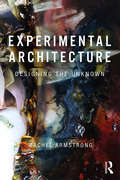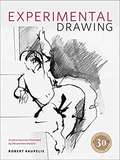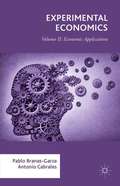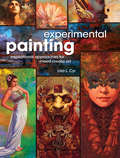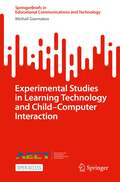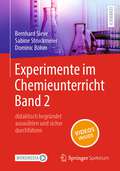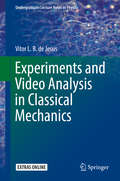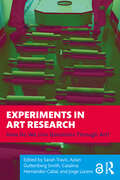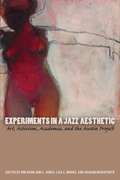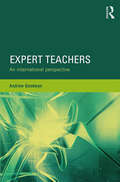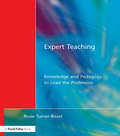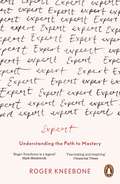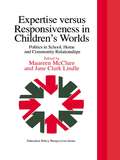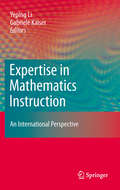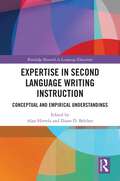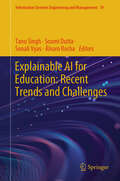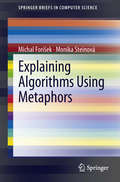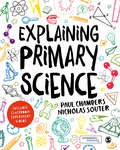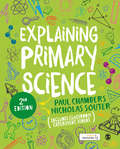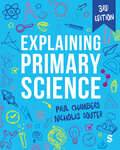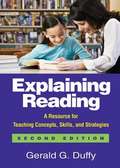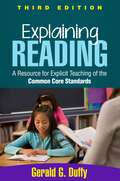- Table View
- List View
Experimental Architecture: Designing the Unknown
by Rachel ArmstrongIn this ground-breaking book, the first to provide an overview of the theory and practice of experimental architecture, Rachel Armstrong explores how interdisciplinary, design-led research practices are beginning to redefine the possibilities of architecture as a profession. Drawing on experts from disciplines as varied as information technology, mathematics, poetry, graphic design, scenography, bacteriology, marine applied science and robotics, Professor Armstrong delineates original, cutting-edge architectural experiments through essays, quotes, poetry, equations and stories. Written by an acknowledged pioneer of architectural experiment, this visionary book is ideal for students and researchers wishing to engage in experimental, practice-based architectural and artistic research. It introduces radical new ideas about architecture and provides ideas and inspiration which students and researchers can apply in their own work and proposals, while practitioners can draw on it to transform their creative assumptions and develop thereby a distinctive "edge" to stand out in a highly competitive profession.
Experimental Drawing: Creative Exercises Illustrated By Old And New Masters
by Robert KaupelisAs with most art forms, it's best to comprehend traditional drawing techniques before you break the rules. But once you've mastered the basics, you may find that you gravitate to more abstract ways of rendering everything from still lifes to figures. However, this book is not only about avant-garde style; it is experimental in that it forces the artist out of his or her comfort zone, whatever that might be. In this book, renowned New York University professor, Robert Kaupelis, shares the tutorials that he used with his students, offering illustrations of drawings and paintings from old masters to contemporary artists (and even some outstanding works from his students) to explain techniques. Covering everything from creating form through contour drawings to drawing with new technology, Experimental Drawing helps you zero in on concepts and form ideas that may take your work to a new and more intriguing level. Some of the innovative exercises you'll find here include: • Drawing models while blindfolded • Engaging in group drawing sessions popularized during the Dada era • Utilizing different drawing materials like glass, plastic, feathers, string, sponges, metal dust, and more • Reducing a post's brushstroke from six to one • Using cross-contour lines for a more abstract still life • Integrating a grid system on a carefully rendered scene to create an illusion of distorted space and movement • And much more... This classic volume's inventive and stimulating projects will help serious artists develop their own vision and their own way to draw. Includes more than 200 spectacular drawings by old and modern masters from Michelangelo to Jasper Johns.
Experimental Painting: Inspirational Approaches for Mixed Media Art
by Lisa L. CyrWith page after page of stimulating possibilities, this book guides you on an uncompromising journey to visually dynamic, conceptually provocative, utterly original art. Embrace the spirit of creative play, break out of your comfort zone, and take your art to a whole new level. In her follow-up to the popular Art Revolution, Lisa L. Cyr delves deeper into an inspiring range of two and three-dimensional mixed-media techniques. Discover fresh, alternative ways to apply and manipulate painting media, transform surfaces, and create distinctive, message-driven work. Inside you'll find: A wide array of unconventional tools, materials and processes that help artists blaze their own unique and creative paths 12 step-by-step demonstrations highlighting specific experimental techniques, including freeform painting, making custom tools, and building dimension into a surface with inlaid boxes 3 feature demonstrations showing mixed-media processes at play in the creation of original artworks, from concept to completion A chapter on creative self-promotion revealing the latest marketing and presentation strategies for the working artist
Experimental Studies in Learning Technology and Child–Computer Interaction (SpringerBriefs in Educational Communications and Technology)
by Michail GiannakosThis book is about the ways in which experiments can be employed in the context of research on learning technologies and child–computer interaction (CCI). It is directed at researchers, supporting them to employ experimental studies while increasing their quality and rigor. The book provides a complete and comprehensive description on how to design, implement, and report experiments, with a focus on and examples from CCI and learning technology research. The topics covered include an introduction to CCI and learning technologies as interdisciplinary fields of research, how to design educational interfaces and visualizations that support experimental studies, the advantages and disadvantages of a variety of experiments, methodological decisions in designing and conducting experiments (e.g. devising hypotheses and selecting measures), and the reporting of results. As well, a brief introduction on how contemporary advances in data science, artificial intelligence, and sensor data have impacted learning technology and CCI research is presented. The book details three important issues that a learning technology and CCI researcher needs to be aware of: the importance of the context, ethical considerations, and working with children. The motivation behind and emphasis of this book is helping prospective CCI and learning technology researchers (a) to evaluate the circumstances that favor (or do not favor) the use of experiments, (b) to make the necessary methodological decisions about the type and features of the experiment, (c) to design the necessary “artifacts” (e.g., prototype systems, interfaces, materials, and procedures), (d) to operationalize and conduct experimental procedures to minimize potential bias, and (e) to report the results of their studies for successful dissemination in top-tier venues (such as journals and conferences).This book is an open access publication.
Experimente im Chemieunterricht Band 2: didaktisch begründet auswählen und sicher durchführen
by Bernhard Sieve Sabine Struckmeier Dominic Böhm„Welches von den vielen Experimenten soll ich denn nehmen? Wie ordne ich die Experimente sinnvoll in meinem Unterricht an? Was muss ich bei der Durchführung bedenken?“ Wenn Sie sich als Lehramtsstudierende*r, Lehrkraft im Vorbereitungsdienst, Chemie fachfremd unterrichtende Lehrkraft oder frisch eingestellte Chemielehrkraft diese oder ähnliche Fragen bei der Planung Ihres Chemieunterrichts stellen, halten Sie gerade den zweiten Band einer idealen Planungshilfe in den Händen. Auch „alte Hasen“ können mit den zwei Bänden ihr Repertoire an Experimentierkunst erweitern.Die zwei Bände Experimente im Chemieunterricht enthalten eine Sammlung von über 400 praxiserprobten Schulexperimenten für den Chemieunterricht der Sekundarstufen I und II. Darüber hinaus sind zu jedem Experiment Durchführungshinweise und Gefährdungseinstufungen, Anregungen zur inhaltlichen Strukturierung des jeweiligen Unterrichtsthemas sowie Hinweise zur fachlichen und fachdidaktischen Einbettung aufgeführt. Videos zur Handhabung ausgewählter Geräte sowie zu zentralen Arbeitsweisen der Chemie unterstützen die Gestaltung eines gefahrenminimierten Chemieunterrichts. Als weiteres digitales Zusatzmaterial wird zu jedem Experiment eine editierbare Word-Version bereitgestellt. Über einen Verweis zur Datenbank DEGINTU können sie zudem Gefährdungsbeurteilungen zu zahlreichen Experimenten abrufen.Diese einzigartige Kombination von experimenteller und fachlich-fachdidaktischer Betrachtung hilft Ihnen bei der zielführenden Auswahl geeigneter Experimente für das jeweilige Unterrichtsthema und schafft damit eine zentrale Voraussetzung für lernwirksamen Chemieunterricht. Experimente im Chemieunterricht Band 1 und Band 2 – ein Muss für jede Chemielehrkraft!
Experiments and Video Analysis in Classical Mechanics (Undergraduate Lecture Notes in Physics)
by Vitor L. B. de JesusThis book is an experimental physics textbook on classical mechanics focusing on the development of experimental skills by means of discussion of different aspects of the experimental setup and the assessment of common issues such as accuracy and graphical representation. The most important topics of an experimental physics course on mechanics are covered and the main concepts are explored in detail. Each chapter didactically connects the experiment and the theoretical models available to explain it. Real data from the proposed experiments are presented and a clear discussion over the theoretical models is given. Special attention is also dedicated to the experimental uncertainty of measurements and graphical representation of the results. In many of the experiments, the application of video analysis is proposed and compared with traditional methods.
Experiments in Art Research: How Do We Live Questions Through Art?
by Sarah Travis Jorge Lucero Azlan Guttenberg Smith Catalina Hernández-CabalExperiments in Art Research: How Do We Live Questions Through Art? is not a conventional research methods guide; it's an encounter for asking questions through art.Originating from the work of a community of tightly connected scholars, artists, and teachers, the book unfolds through a tapestry of moments, practices, and people, embracing the celebration of works in progress and in community. Rooted in the practice of permission-giving, the narrative intertwines personal stories—laying bare the transformative power of unconventional teaching methods, risky endeavors, and the breaking of scholarly norms—and begins by understanding that “art” and “research” are not separate. After that, there are endless directions to take up. Instead of a handbook offering rules or best practices, this text offers an inspiring collection of joy, longing, and determination.This is fascinating reading for arts-based researchers, artists, educators in the arts, education scholars, research-creators, performance theorists, art history scholars, art education scholars, inter- and anti-disciplinary scholars, qualitative and post-qualitative researchers, decolonization scholars, public humanities scholars, and writing pedagogy scholars.
Experiments in a Jazz Aesthetic
by Omi Osun Joni L. Jones Lisa L. Moore Sharon BridgforthIn Austin, Texas, in 2002, a group of artists, activists, and academics led by performance studies scholar Omi Osun Joni L. Jones formed the Austin Project (tAP), which meets annually in order to provide a space for women of colour and their allies to build relationships based on trust, creativity, and commitment to social justice by working together to write and perform work in the jazz aesthetic. Inspired by this experience, this book is both an anthology of new writing and a sourcebook for those who would like to use creative writing and performance to energize their artistic, scholarly, and activist practices. Theoretical and historical essays by Omi Osun Joni L. Jones describe and define the African American tradition of art-making known as the jazz aesthetic, and explain how her own work in this tradition inspired her to start tAP. Key artists in the tradition, from Bessie Award-winning choreographer Laurie Carlos and writer/performer Robbie McCauley to playwrights Daniel Alexander Jones and Carl Hancock Rux, worked with the women of tAP as mentors and teachers. This book brings together never-before-published, must-read materials by these nationally known artists and the transformative writing of tAP participants. A handbook for workshop leaders by Lambda Literary Award-winning writer Sharon Bridgforth, tAP's inaugural anchor artist, offers readers the tools for starting similar projects in their own communities. A full-length script of the 2005 tAP performance is an original documentation of the collaborative, breath-based, body work of the jazz aesthetic in theatre, and provides both a script for use by theatre artists and an invaluable documentation of a major transformative movement in contemporary performance.
Expert Teachers: An international perspective (The\expert Teacher Ser.)
by Andrew GoodwynExpert Teachers is a compelling book that explores issues surrounding the concept of the expert teacher from a truly international perspective. Expert teaching, a global phenomenon that exerts significant influence on education policy and practice, has developed rapidly since the 1980s and significantly impacted many teachers’ careers. As a result, this book poses pertinent and important questions scrutinising the topic as well as considering possibilities for future models. The book reviews and expands upon issues such as: What does it mean to be an ‘expert’ teacher? What have been the most successful models of expert teaching? Is rewarding a minority of the ‘best’ teachers a sustainable method of raising standards? What is the role of expertise in furthering the aim to make teaching a ‘top tier’ career? What are the dominant and emerging models of expert teaching globally? What ways can we expect models of expert teaching to develop in the future? With case studies of specific systems, and analyses of the issues and context therein, this book offers an exceptional insight into the effects of expert teaching models – their effects on the teacher as an individual as well as standards and education policy internationally. The book argues that the current focus on pursuing misleading high-stakes test scores is underserving the teaching profession and that instead the focus for expert teaching should be grounded in issues of social justice and community wellbeing. This book will appeal greatly to current teachers, those currently undertaking teacher training and students or academics carrying out research in the field of teacher education, professional development and expertise.
Expert Teaching: Knowledge and Pedagogy to Lead the Profession
by Rosie Bisset TurnerThis book is aimed at teachers who wish to improve their professional practice and will help them to think about current practice, not only in terms of skills and competences to be developed, but also areas of knowledge to be enriched. The model of knowledge bases presented is a valuable framework for reflecting on practice and for analyzing professional development needs. The book is therefore an ideal text for teachers taking courses that may lead towards an advanced qualification in teaching or who are undertaking in-service training and action research programs. Teachers approaching 'threshold assessment' will find the book useful in reflecting on the quality of their teaching.
Expert: Understanding the Path to Mastery
by Roger Kneebone'Roger Kneebone is a legend' Mark Miodownik, author of Stuff Matters'Fascinating and inspiring' Financial Times'The pandemic has made the necessity of relying on experts evident to all . . . this is a rich exploration of lifelong learning' GuardianWhat could a lacemaker have in common with vascular surgeons? A Savile Row tailor with molecular scientists? A fighter pilot with jazz musicians? At first glance, very little. But Roger Kneebone is the expert on experts, having spent a lifetime finding the connections.In Expert, he combines his own experiences as a doctor with insights from extraordinary people and cutting-edge research to map out the path we're all following - from 'doing time' as an Apprentice, to developing your 'voice' and taking on responsibility as a Journeyman, to finally becoming a Master and passing on your skills. As Kneebone shows, although each outcome is different, the journey is always the same. Whether you're developing a new career, studying a language, learning a musical instrument or simply becoming the person you want to be, this ground-breaking book reveals the path to mastery.
Expertise Versus Responsiveness In Children's Worlds: Politics In School, Home And Community Relationships (Education Policy Perspectives Ser.)
by Jane ClarkFirst Published in 2004. Routledge is an imprint of Taylor & Francis, an informa company.
Expertise in Mathematics Instruction
by Yeping Li Gabriele KaiserAccumulated research findings in past decades have led to the common knowledge that teachers' professional knowledge is essential to effective classroom instruction. However, there is still very limited understanding about the nature of teachers' expertise in mathematics instruction. Expertise in Mathematics Instruction addresses this need clearly and concisely. In particular, it examines all aspects of emphases employed to characterize the nature of expertise in mathematics instruction from both researchers' and practitioners' perspectives. Moreover, with research contributions from both the East and the West, this book also examines ideas pertinent to fostering and demonstrating expertise in mathematics instruction within different system contexts. This book will raise questions and issues for mathematics education researchers to guide a critical examination of what can be learned from other education systems. Expertise in Mathematics Instruction builds on its theoretical and methodological approach with contributions from international experts in the field. Additionally, a review of related research from mathematics education serves as an introduction to the new research in both Eastern and Western settings. Concluding this resource is a reflection on the benefits of this international collaboration and possible research directions for the future. The final chapter cohesively joins traditional and current research for action. Expertise in Mathematics Instruction is of interest to researchers in mathematics education, mathematics teacher educators, and mathematics educators.
Expertise in Second Language Writing Instruction: Conceptual and Empirical Understandings (Routledge Research in Language Education)
by Alan Hirvela Diane D. BelcherDespite growing interest in L2 writing teachers, there is a dearth of published works that specifically delve into the nuances of the development of L2 writing teacher expertise. Informed by relevant foundational theory and empirical research, this book addresses this crucial gap in the understanding of expertise in L2 writing instruction.This book offers a holistic analysis of L2 writing instruction, serving as a valuable resource for those involved in the development of L2 writing teacher educators, as well as novice teachers striving to hone their skills in teaching L2 writing. It draws from a wide array of international perspectives on the conceptualization of L2 writing teacher expertise and research in this domain.Significantly, it is the first comprehensive work that places expertise in L2 writing instruction at the forefront. It will interest scholars in the disciplines of foreign and second language education, as well as postgraduate students and aspiring teachers.
Explainable AI for Education: Recent Trends and Challenges (Information Systems Engineering and Management #19)
by Álvaro Rocha Soumi Dutta Sonali Vyas Tanu Singh“Explainable AI for Education: Recent Trends and Challenges” is a comprehensive exploration of the intersection between artificial intelligence (AI) and education. In this book, we delve into the critical need for transparency and interpretability in AI systems deployed within educational contexts. Key Themes Understanding AI in Education: We provide a concise overview of AI techniques commonly used in educational settings, including recommendation systems, personalized learning, and assessment tools. Readers will gain insights into the potential benefits and risks associated with AI adoption in education. The Black-Box Problem: AI models often operate as “black boxes,” making it challenging to understand their decision-making processes. We discuss the implications of this opacity and emphasize the importance of explainability. Explainable AI (XAI) Techniques: From rule-based approaches to neural network interpretability, we explore various methods for making AI models more transparent. Examples and case studies illustrate how XAI can enhance educational outcomes. Ethical Considerations: As AI becomes more integrated into education, ethical dilemmas arise. We address issues related to bias, fairness, and accountability, emphasizing responsible AI practices. Future Directions: Our book looks ahead, considering the evolving landscape of AI and its impact on education. We propose research directions and practical steps to promote XAI adoption in educational institutions.
Explaining Algorithms Using Metaphors
by Michal Forišek Monika SteinováThere is a significant difference between designing a new algorithm, proving its correctness, and teaching it to an audience. When teaching algorithms, the teacher's main goal should be to convey the underlying ideas and to help the students form correct mental models related to the algorithm. This process can often be facilitated by using suitable metaphors. This work provides a set of novel metaphors identified and developed as suitable tools for teaching many of the "classic textbook" algorithms taught in undergraduate courses worldwide. Each chapter provides exercises and didactic notes for teachers based on the authors' experiences when using the metaphor in a classroom setting.
Explaining Primary Science
by Paul Chambers Nicholas SouterSuccessful science teaching in primary schools requires a careful understanding of key scientific knowledge. This book covers all the major areas of science relevant for beginning primary school teachers, explaining key concepts from the ground up, helping trainees develop into confident science educators. Classroom activities and Videos of useful science experiments and demonstrations for the primary classroom are integrated into each chapter to translate concepts into teaching practice. Chapter content is linked to the National Curriculum in England and the Curriculum for Excellence, demonstrating how you could relate understanding to the relevant curriculum taught in schools.
Explaining Primary Science
by Paul Chambers Nicholas SouterSuccessful science teaching in primary schools requires a careful understanding of key scientific knowledge. This book covers all the major areas of science relevant for beginning primary school teachers, explaining key concepts from the ground up, helping trainees develop into confident science educators. Classroom activities and Videos of useful science experiments and demonstrations for the primary classroom are integrated into each chapter to translate concepts into teaching practice. Chapter content is linked to the National Curriculum in England and the Curriculum for Excellence, demonstrating how you could relate understanding to the relevant curriculum taught in schools.
Explaining Primary Science
by Paul Chambers Nicholas SouterSuccessful science teaching in primary schools requires a careful understanding of key scientific knowledge. This book covers all the major areas of science relevant for beginning primary school teachers, explaining key concepts from the ground up, helping trainees develop into confident science educators. Classroom activities and Videos of useful science experiments and demonstrations for the primary classroom are integrated into each chapter to translate concepts into teaching practice. Chapter content is linked to the National Curriculum in England and the Curriculum for Excellence, demonstrating how you could relate understanding to the relevant curriculum taught in schools.
Explaining Primary Science
by Paul Chambers Nicholas SouterSuccessful science teaching in primary schools requires a careful understanding of key scientific knowledge. This book covers all the major areas of science relevant for beginning primary school teachers, explaining key concepts from the ground up, helping trainees develop into confident science educators. Classroom activities and Videos of useful science experiments and demonstrations for the primary classroom are integrated into each chapter to translate concepts into teaching practice. Chapter content is linked to the National Curriculum in England and the Curriculum for Excellence, demonstrating how you could relate understanding to the relevant curriculum taught in schools.
Explaining Primary Science
by Paul Chambers Nicholas SouterSuccessful science teaching in primary schools requires a careful understanding of key scientific knowledge. This book covers all the major areas of science relevant for beginning primary school teachers, explaining key concepts from the ground up, helping trainees and recently qualified teachers develop into confident science educators. This new edition comes with: An exploration of scientific misconceptions on key topics How to take action to protect the environment through primary science teaching A newly streamlined focus prioritising essential primary school subject knowledge Links to national curricula for England and Scotland Videos of useful science experiments and demonstrations for the primary classroom
Explaining Primary Science
by Paul Chambers Nicholas SouterSuccessful science teaching in primary schools requires a careful understanding of key scientific knowledge. This book covers all the major areas of science relevant for beginning primary school teachers, explaining key concepts from the ground up, helping trainees and recently qualified teachers develop into confident science educators. This new edition comes with: An exploration of scientific misconceptions on key topics How to take action to protect the environment through primary science teaching A newly streamlined focus prioritising essential primary school subject knowledge Links to national curricula for England and Scotland Videos of useful science experiments and demonstrations for the primary classroom
Explaining Reading, Second Edition
by Richard Allington Gerald DuffyThis bestselling teacher resource and widely adopted text demonstrates the 'whats,' 'whys,' and 'how-tos' of explicit reading instruction for struggling K 8 learners. The book describes 23 skills and strategies associated with vocabulary, comprehension, word recognition, and fluency. Ways to explain each skill or strategy are illustrated in real-world examples that teachers can use as starting points for their own lessons. Retaining the straight-talking style that made the prior edition so popular, the second edition has been revised and updated to reflect reader feedback and the latest research. New to This Edition Incorporates important new research on vocabulary and comprehension. Stronger emphasis on embedding instruction in authentic reading experiences. A chapter on teaching "big-picture" ideas about strategy use. Revised teaching examples are even more thorough and teacher friendly
Explaining Reading, Third Edition
by Gerald G. DuffyThis trusted teacher resource and widely adopted text presents effective ways to demystify essential reading skills and strategies for K-8 students who are struggling. It has been fully revised to focus on the Common Core State Standards (CCSS) for English language arts. Following a concise introduction to the CCSS and explicit teaching, 30 engaging examples show how to be explicit when teaching each Literature, Informational Text, and Foundational Skills standard. Grounded in authentic reading tasks that teachers can adapt for their classrooms, the examples guide teachers to differentiate instruction, model and scaffold learning, assess student skills, and align reading instruction with Common Core writing standards. New to This Edition *Significantly revised and restructured with a CCSS focus. *The teaching examples are all new or revised. *Provides practical ways to develop "close reading" of text. *Incorporates recent research on authentic tasks and adaptive teaching.
